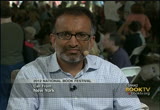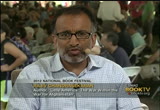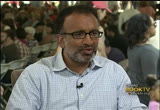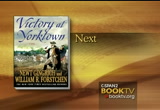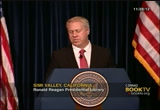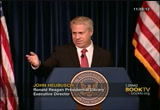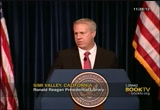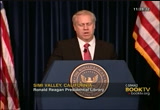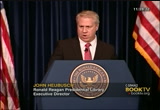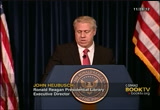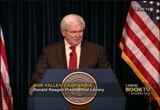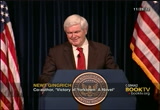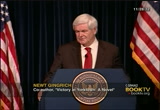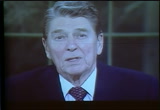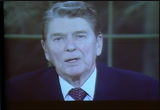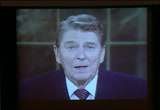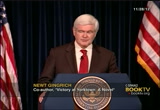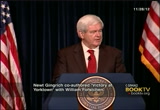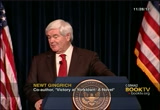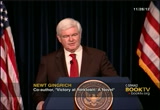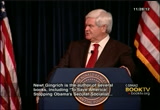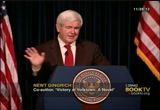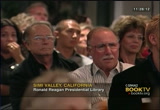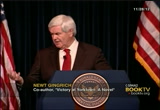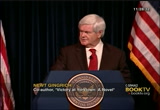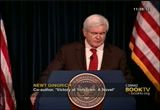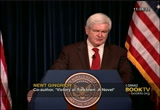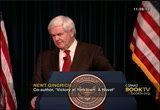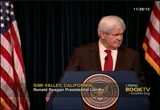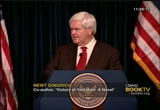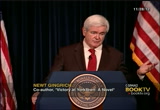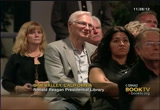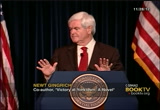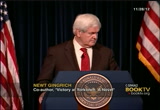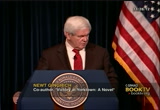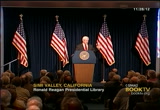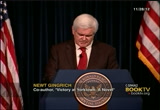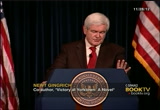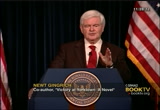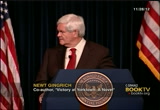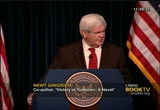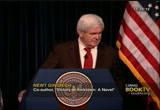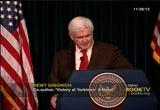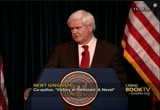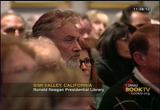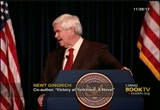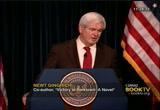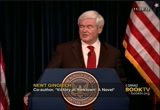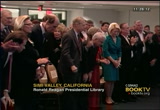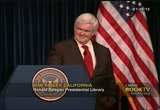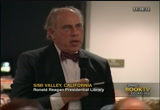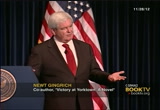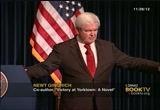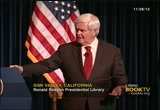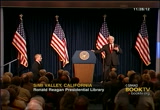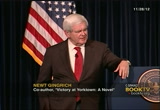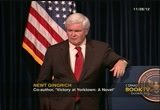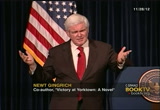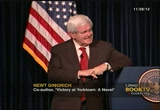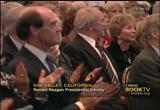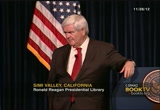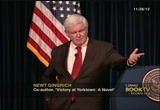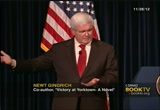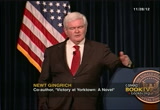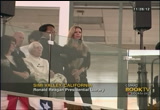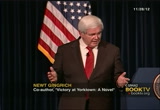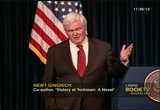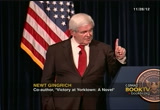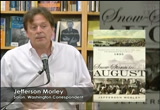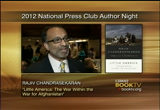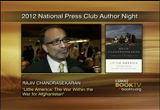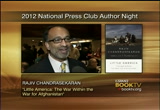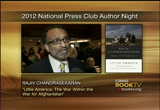tv Book TV CSPAN December 30, 2012 7:45am-9:00am EST
7:45 am
think that the war in afghanistan is actually going to do to the delicate turmoil of the situation that has been going on for almost 2000 years over the? >> guest: well look, there's been an awful lot of tribals, factional fighting that has occurred in afghanistan, as we know, for centuries. and our presence there isn't going to, in fact, and, in fact, as our troops start coming home you want again start to see there is ethnic groups, various tribal alliances starting to josh for power, much as they have over the previous many, many years. get the idea that somehow you can create this post a tribal big tent government that will pacify the country, i think is a bit of a dream. we will continue to have a messy chaotic future there for some time to come, unfortunately.
7:46 am
>> rajiv, when we over in afghanistan to write this book? book? book? >> i traveled the initial in early 2000. i made 15 trips from 2009 through this year, many of them several weeks at a time. i traveled all over the country, but i emphasize my time in the south. i spent a lot of time with our military forces, with u.s. marines into helmand province, with army soldiers in kandahar, with american diplomats and reconstruction workers, and with the afghan people. traveled around by helicopter, by my is that trucks, pickup trucks, by donkey, and really -- >> we able to get out on your own? >> yes. fortunately, though i'm an american, i'm blessed with dark skin and this beard. >> did that make a difference? >> it did make a difference. it allowed me to blend in perhaps in ways it would be more
7:47 am
difficult for you to do in kandahar. >> rajiv chandrasekeran, here is his most recent book, "little america: the war within the war for afghanistan." he has been our guest here on booktv on c-span2. thank you, sir. >> thank you. real pleasure. >> visit booktv.org to watch any of the programs you see here online. type the author or book title in the search bar on the upper left side of the page. click search. you can share anything you see on booktv.org easily by clicking share on the upper left side of the page and selecting the format. booktv streams live online for 48 hours every weekend with top nonfiction books and authors. tv.org. >> next, former speaker of the house newt gingrich presents the second book in his historical fiction series on george washington, "victory at yorktown" but it's a little over an hour. >> good evening, everyone.
7:48 am
my name is john, and i had the honor of being executive director of the ronald reagan presidential foundation, and it's my pleasure to welcome all of you here on this rainy evening. in honor of our men and women in uniform who defend our freedom around the world, if you would please stand and join me for the pledge of allegiance. >> thank you, please be seated. >> before yes, sir. i would like to recognize a few special guests we have with us today but i'd like to begin with a welcome to one of our members of our board of trustees and a former governor of the state of
7:49 am
california, pete wilson. governor. [applause] >> also with us tonight is a terrific congressman who is retiring after 26 years of terrific service and his wife. [applause] >> our ventura county supervisor, peter, thank you for coming. [applause] >> now for those of you who are patient enough to go through the book signing line just prior to the event this evening, you know this wonderful woman is here with us tonight. she's a best selling author, "new york times" best selling author and the president of gingrich production, ladies and gentlemen, please join me in welcoming callista gingrich. [applause]
7:50 am
so we have with us tonight a very special guest. i know that if i were simply to give a difficult introduction to spend her gingrich, the one where you list every accomplishment of the speakers bio, i promise you we would be here all night and even he would get bored. [laughter] >> his list of achievements in politics, his involvement in lifelong learning, his expertise in national security matters, his business interest, his philanthropic endeavors, the dozens of books he's written, the list goes on and on. so allow me for the moment to presume that all of us here are already well a coin with the important milestones in the life of one newt gingrich. because i want to focus in some part on the future. and what i sincerely hope is newt's place in it as it relates to ideas. so let me explain. it is no secret to anyone here
7:51 am
that the party of abraham lincoln and ronald reagan took a beating three weeks ago. republicans lost the battle for the white house the white house as well as seats in both the house and the senate. now, most are still stinging badly from that defeat. i know this from firsthand experience, as many are visiting the reagan library in droves lately, and what seems to be a quest. a quest to remember a great president, and remind themselves of these ideals, his optimism, and what he did to inspire americans to greatness. we should remind ourselves that while our 40th president had the uncanny ability to reach into the hearts and minds of americans, it was ronald reagan himself who said, quote, i wasn't a great communicator. i communicated great things. today, we can recognize the
7:52 am
great things spring from great ideas. we can also take heart that there are leaders in our time like speaker newt gingrich who has great contributions to make in the way of such ideas. now, there's plenty of precedent here. when newt was first elected to office in 1978 in georgia, his party, like the republican party today, was in the wilderness. the jimmy carter occupied the white house, and both the house and senate were safely in democratic hands. but with the election of president reagan in 1980, republicans took both the house and the senate. but in the house, where newt gingrich went to work each day, he was badly outnumbered. now, i worked as a hill staffer for a congressman's office who was only steps away from newt, and i can assure you for representatives like newt, the minority was often a lonely place. the republicans had not held the
7:53 am
majority there since 1954, and it was not a soul alive who could ever imagine a republican majority again. oh, except for newt. with no seniority but a tireless work ethic, a vision and a mind filled with ideas, it was newt gingrich who sat in the back benches of congress and methodically devise a strategy over several years to make the republican party a party of ideas once again. it was newt edifies the famous contract with america. plan to give republicans more than something to run against the historic 1944 election. he gave them something to run for. it was newt who rallied the faithful behind these ideas and took back the house after 40 years in the minority. it was newt who helped engineer
7:54 am
passage of the welfare reform and to balanced budgets during his time as speaker of the house. he's been on the national stage ever since, pushing america and the conservative movement forward with his ideas. so ladies and gentlemen, i'd like you to please join me in welcoming to the reagan library, speaker newt gingrich. [applause] >> thank you. thank you all very, very much. it's always an honor to be back at the reagan library. i want to thank john for the great job he does of really
7:55 am
providing leadership on a day-to-day basis, the degree to which of this library as a model of educating young people is really remarkable. analog that goes to the energy, and to be candid, the fund-raising ability that john brings us. so, john, thank you for your work. [applause] >> i hope all of you will join close to me in keeping mrs. reagan in your prayers. she is a remarkable woman who spent a lifetime serving this country. and we all cherish her, as she continues to be active and continues to play a role here at the library. so i couldn't come here, and i mentioned nancy fortissimo their aisles with say, governor, it's great to be back with you. we did a lot of things over the years. from being made in san diego to u.s. senator to governor, to a leader in a variety of ways. i look to pete wilson and to
7:56 am
gale as great people who represent the willingness to serve the state and the country in an important way. i want to say, it's always a family engagement if you're out there, thank you both for serving the country but it really does make a difference. it's great to be back here. [applause] >> i did not you would be with us, but we are thrilled to have you here. callista and i have launched what we call an american legacy book tour. we are very fond of the library, as you know, and we made a movie called ronald reagan -- i want to recognize tonight kevin and his wife are here. kevin was the director of that film, and we are just always thrilled to be with kevin because he does such a great job with movies within together. and so, we come back to the reagan library from a unique background, and you may wonder why we talk about an american legacy book tour.
7:57 am
you may wonder why callista has created an alliance with the elephant to create -- -- and why i have witnessed many novels as i have come and i thought the best person who could explain our commitment to american history being at the reagan library was president reagan. so join me for a minute. we want to show you part of president reagan's farewell address. his last speech in the oval office but i think this captures perfectly why we have an american legacy book tour. >> there's a great tradition of warning in presidential farewells, and i've got one that's been on my mind for some time. and hardly enough, ma it starts with one of the things i'm proud enough in the past ages. the resurgence of national pride that i called the new patriotism. this national feeling is good. but it won't count for much and it won't last unless it's grounded in thoughtfulness and knowledge.
7:58 am
and informed patriotism is what we want. and are we doing a good enough job to teach our children what america is and what she represents in the long history of the world? those of us who are over 35, grew up in a different america. we would talk very directly what it means to be an american. and we have a love of country and an appreciation of its institutions. if you didn't get these things from her family, you got them from the neighborhood. from the father down the street thought in korea, or the family who lost someone, or you get a sense of patriotism from school. and if all else, you can get a sense of patriotism of the popular culture. the movies celebrated democratic value, implicitly reinforced the idea that america was special. tv was like that, too, through the mid '60s. but now we're about to enter the '90s, and some things have
7:59 am
changed. younger parents are not sure that i'm ambivalent appreciation of america is the right thing to teach modern children. and it's for those who crave the popular culture well grounded patriotism is no longer the style. our spirit is back, but we haven't reinstitution allies did. we've got to do a better job of getting the thought that america is freedom. freedom of speech, freedom of religion, freedom of enterprise, and freedom is special and rare. it's fragile. it needs production. so we've got to teach history based not on what -- but what's important. why the pilgrims came here, what those 30 seconds over tokyo meant. four years ago on the 40th anniversary of d-day, i read a letter from a young woman writing to her late father who had fought on omaha beach. her name was lisa, and she said
8:00 am
8:01 am
>> i want to thank the staff here at the library, because i called this afternoon, and i said, you know, i've been thinking about how to introduce this talk, and it occurred to me it's pretty stupid for me to quote reagan, and i could get reagan to quote reagan, and i think you will all agree there's a power to what he did and how he did it. i also believe, by the way, that's at least 50% of the explanation why we're in the mess we're in. those of us who are conservative lacked the courage to take on the school board, the teachers' union, the local academic elites, the news media, the entertainment culture. and we ceded ground which has crippled this country's understanding of itself. and part of what california lis saw and -- ca list that and i have done, in my case with writing novels is to try to get
8:02 am
across to the american people this is a country worth knowing, and you know it by learning its history. you become an american. any other place in the world you can claim genetic pattern, geography, it's not true here. you can come here from haiti, somalia, china, mexico, in calista's case her grandparents came from switzerland and poland, in my case they came from places like scotland and ireland. you can come from anywhere, and you can learn to be an american. but to do that, the you have to learn to be an american. and if you have an academic elite and a news media elite and an entertainment elite who are opposed to teaching you how to be american, you cut off the life blood of this country. that's why we have an american legacy tour. now, several people said when they found out i was coming out here that if i'm going to come out here and talk about george washington, which to a lot of people seems a long way off, and
8:03 am
i talk about sweet land of liberty and land of pilgrim's pride, both of callista's books have become bestsellers, it's actually about the 13 controlnies. her mother, who's now 80, wrote her and said you should not say this is for 4-8 years old, this is for 4-80 years old because nobody has studied the colonies and, therefore, it's brand new information for everybody. somebody said to me, okay, you're going to do that, but what you really should do in order to engage washington and the national media is you should apply it to the fiscal cliff. and i thought to myself at the reagan library what better place to go back to first principles. and since i've written now three novels on george washington, what better pattern than to weave these two giants, ronald
8:04 am
reagan after whom the soviet empire disappeared, and george washington after whom we became a country. and ask yourselves what are the lessons of history? i don't study history because it's an interesting habit, i study history to better understand the present and the future so that i can be engaged in making history by being an intelligent, informed perp. that's what citizenship ought to be. and so what are some of the lessons? now, let me start with the fiscal cliff. and i'd ask a simple, obvious question. this is a very sophisticated group. how many of you have heard the term "fiscal cliff"? [laughter] okay. now, i want to say something which in washington will be seen at heretical and as gingrich once again going off and doing things that make no sense like the contract with america, balanced budget, i've participateed in my career with reagan's supply-side economics.
8:05 am
i'm proud of the number of things i've participated in that made no sense in washington. [laughter] there is no fiscal cliff. this is absolute, total nonsenses. the best way to understand what happens to all of us is to read a great essay by tom wolfe, thomas wolfe enentitled mar mowing the flak catchers. this goes back to, i think, the '60s when he first wrote it. now, wolfe is trying to describe a particular pattern in san francisco. in which the welfare department has figured out that all of the senior welfare people should be on the second floor of the welfare office hiding from the people they serve. and the newest, least paid people should be on the ground floor screening the people who are mad. and wolfe describes the samoan community in san francisco.
8:06 am
as having figured out what the game was. and so you would have 6-5 and 6-6 samoans come in carrying traditional native war clubs. [laughter] and they would walk up to the front desk, and they would say i want to see the boss. and the underpaid, brand new staff person would say, uh, we're not supposed to let you see the boss. and they would start to hit the floor with their club. and so you'd have this normal-sized person staring up at this gigantic samoan with his war club and thinking to himself, do today pay me enough for the next part of this? [laughter] and if you haven't read this essay, thomas wolfe is one of the greatest observers of the american scene in our generation. if you've never read this, it's worth going back and reading because we're revisiting everything wolfe, everything wolfe described in his great early essays.
8:07 am
we're revisiting. because the left has continued to mutate and evolve and metastasize and become more baroque than it was when wolfe first described it. and so now instead of it being the local samoans at the local san francisco office, it's the national news media. and they get together, and they chant fiscal cliff, fiscal cliff, fiscal cliff. and if you're an intelligence politician and you walk out to do a press conference and you say what i just said to you -- which is the fiscal cliff is a fantasy, it is an excuse to panic, it's a device to get all of us running down the road so we accept whatever obama wants because otherwise we have failed the fiscal cliff, and how can you be a patriot if you don't do what the fiscal cliff requires? and the fiscal cliff will tell us one afternoon much like the land of oz where there will be this person hiding behind the machine who will say raise taxes now. and if you don't raise taxes
8:08 am
now, you'll have violated the fiscal cliff. now, do any of you want to be the person who stands up and destroys america by violating the fiscal cliff? do you want to explain that you are so out of touch of life that you don't care america's going to die late on thursday? [laughter] it's all right if that's the kind of person you are, because we just need to know it now because we're never going to schedule it. [laughter] after all, you're or clearly weird. [laughter] so let me start with the fiscal cliff idea and say there is no fiscal cliff. let me say second act conservatives and republicans -- about conservatives and republicans who are demoralized, get over it. we had a bad election. we did a number of stupid things. we faced an opponent who worked harder than we did, did some clever things. ronald reagan, one of his most important single statements is february 1975 in washington at the conservative political
8:09 am
action committee meetingment now, i was part of this. i ran in '74. i've had no sense of timing. so i picked watergate to run in. [laughter] i'm in georgia. i'm a yankee-born army brat with a strange accent, a weird name running as a republican during watergate. this was beyond not clever. [laughter] this was like, you know, don't give him money, pay for the therapy. [laughter] in december of 1974 republican party id was at 17%, and there was serious talk about is the party going to disappear and be replaced. now, it was nonsenses, but it was serious talk , and i was part of the group doing serious,
8:10 am
in-depth analysis of what went wrong and why did it go wrong. they actually had a series of commercials called republicans are people too. now, when you're in bad enough trouble that you have a commercial that says i'm a person too, you know you're deeply moving. [laughter] it was in this environment that ronald reagan went to cpac and said we need bold colors, no pale pastels. and he was throwing down a battle sign. he was saying don't tell me you've got to sellout, don't tell me you've got to cave, don't tell me you've got to do whatever the left wants. there are moments in history when you draw a line, and you fight. now, we have 30 governors. we have control of the united states house of representatives, we have a huge number of state legislatures. the idea that we are supposed to create a surrender caucus in order to be socially acceptable in washington is absurd.
8:11 am
let's be clear, that's what we're -- that's what people are currently forming in washington. how much do i need to surrender so you won't beat me anymore. when i was finally elected to the congress -- by the way, in terms of my bad scheduling, the second time i ran jimmy carter was at the head of the democratic ticket. and i remember it was the best campaign technically i ever ran. and it felt really good towards the end. and we've been think these moments when everything feels right because you're the candidate, and you're in the middle of the cocoon. so i went in to vote on election day, 1976, and the state of georgia was very proud that jimmy carter was the nominee. and i found myself standing in line behind three people who had come from the nursing home. [laughter] to get revenge for sherman's march through georgia. [laughter]
8:12 am
and i thought to myself, how likely is it that after they vote for jimmy carter they will submit their ticket for a yankee-born army brat on the republican side? and i thought, this is going to be a long evening. [laughter] and it was, i went from 48.5% against the dean of the delegation in '74 to barely enough to survive in '76. getting in, carter proved the left can't govern, and by 1978 i won the seat. when i came to washington, the democrats had been so dominant from 1973 on that they would salter onto the floor of the house looking for republicans to beat up. [laughter] and republicans would shrink onto the floor of the house hoping not to be noticed.
8:13 am
and the new generation who were elected starting in '78 literally banded together and went to the floor of the house to find democrats to beat up. and we'd pick fights with them. i'm talking about -- i'm talking about debating, i'm not talking about physically. i just want to make that clear so that nobody in the national media says gingrich advocates beating up democrats. [laughter] you have to be very careful how these things spread. but i do agree passionately with margaret thatcher's rule. first you win the argument, then you win the vote. so we'd get groups of people who would go to the floor regularly and start debating. and after a while the democrats stopped coming to the floor, because they understood there were more of us that were prepared to debate than there were of them. we studied it every week because we didn't have to govern. the minority, as phil graham once pointed out to me when he switched sides and he became a republican, he said if you're in the majority, you have to have an idea, fashion it into a bill,
8:14 am
hold hearings, mark up the bill, pass through your body, go to conference with the senate, get something done. you're busy all day long trying to achieve something. if you're in the minority, you get to golf and vote no. [laughter] that becomes a self-perpetuating model. and one of the things i would say to the house ore palins is to get a grip -- the house republicans is to get a grip. they are the majority. they're not the minority. they don't need to cave in to obama, they don't need to form a surrender caucus. the senate, as pete knows, is an institution in which individuality totally dominates teamwork. each senator is a unique figure, each senator somehow fashions out what they're going to do. you're not going to, in the short run in the minority, organize the senate republicans in terms of actually being able to do something positive. you may be able to organize them
8:15 am
to do negative things, you're o not going to get them to suddenly, magically come up with a formula because there are always going to be five or six difficult versions depending on how many senators are in the room. on the house side, you're in a different situation. you are the majority. you control the schedule. you control the committees. you control the hearings. and so my number one bit of advice to the congressional republicans is simple: back out of all of this negotiating with obama. the president is overwhelmingly dominant in the news media. you start setting up the definition of success finding and agreeing with obama, you just gave obama the ability to say to you, not good enough. we send welfare reform down to clinton three times, and he vetoed it the first two times. we didn't start by reaching an agreement, we started by doing something. if the house republicans would say to every single subcommittee -- and there are a ton of subcommittees -- every
8:16 am
one of you is going to hold hearings on waste in government, so why don't you go back home, and they could create 1-800-waste. [laughter] okay? probably technically a few more letters in there, so i'll let you add whatever the right number are to get to the number for the phone company. or to put it online which is a better way to do it and also have it available in a variety of other formats and say, look, you send us everything you think we should hold hearings on. how many americans do you think could find one or two or three items of waste that they would be willing to suggest congress hold a hearing on? so within the first two or three weeks you'd have five million suggestions. and you could say, look, this is what he wants to raise taxes for. somebody from new jersey said to me two days ago their estimate is that in the fema effort, the federal emergency management agency effort in new jersey one dollar of every three is waste.
8:17 am
now, that may be a little bit high, a little bit low, but it gives you a flavor. certainly, it was true in katrina. so you start saying to yourself let's have a discussion about how many billions have been thrown away on bad loans and solar power. let's have a discussion about why we're still sending money to egypt. let's have a discussion about how much money is being wasted by various agencies. let's have a discussion about whether or not we want to give epa this money to enact a radical program. now suddenly you're in a different conversation. but instead, the president and the news media have magically gotten the republicans into an argument over taxes. and then, and i give obama great credit for this, i have never seen anybody better at finding trivial distractions in order to avoid responsibility. [laughter] [applause] and let me say to give you a
8:18 am
2012 variation on ronald reagan's 1975 bold colors, no pale pastels, obama light is not a winning formula for the republican party. [applause] so let's start with how the media operates. the media operates in collaboration with the white house first to create panic. you're going to run off the fiscal cliff unless you're totally insane and do exactly what we're told to do and, therefore, you're a bad person if you ask the question why is there a fiscal cliff, and will america be dramatically different on january 2nd if, in fact, we just hold our breath and see what happens. second, you then go to distraction. the current distraction is grover norquist. now, i've known grover norquist for a long time. i think he's a fine person. he holds no elective office and, in fact, he wasn't elected president.
8:19 am
so the president of the united states who is responsible for figuring out our problems who has not offered a single serious, cost-cutting measure, i mean, tell me what you think barack obama's going to go to the house and senate democrats and say i need a yes vote on this cost cutting. instead of dealing with the fact that the president of the united states is once again totally failing to provide leadership, the president has cleverly gotten us worried about whether grover norquist now defines the republican party. because as we all know, if we are not worthy of the news media's respect and love -- [laughter] we are a party that will disappear. i mean, just listen to the tone of the language when you watch morning joe or you watch, you know, even fox and friends are off on this whole. shtick. and grover did something very important. he came up with the idea of a
8:20 am
no-tax increase pledge as a way of drawing a line in the sand. i voted against the tax increases under reagan -- i say this in the reagan library -- i voted against the tax increase of george h.w. bush which i think was a disaster and a fundamental mistake, and when we balanced the budget for four straight years, the only time in your lifetime, we did it by cutting taxes to accelerate economic growth. so i clearly represent a different view. [applause] but i have no problem if somebody wants to break their no-tax pledge. if they are prepared to go home and explain it. but this idea that they're creating this posturing, several senators have said i'm not afraid of grover norquist. well, i just want to put in the record here i've known grover for years, i'm not afraid of grover norquist.
8:21 am
they didn't give their pledge to grover norquist. they gave their pledge to the voters of their state. ms. now, there are circumstances where you raise taxes. ronald reagan, you have in your archives this great video. reagan campaigned at one point and said my feet are in concrete. and being reagan, he could get away with going to the press conference one morning and saying the sound you're hearing is concrete breaking. [laughter] because as governor he concluded in order to meet the state's requirements he had no choice. but it never cost him very much because he was totally up front and totally honest, and he went to the people of california and said, look, here's where we are. it's a bigger mess than i thought it was, i can't fix it any other way, i think we have to do this. but he did that after creating a commission which fundamentally cut costs and dramatically cut spending. i mean, nobody thought ronald reagan was raising taxes to create a bigger government. they figured out if he needed it, then it must be really
8:22 am
serious. what we have today is no innovation, no reform, no new thinking, no creativity, no hearings on waste, no hearings on better ways of doing things. you live in the age of the ipad and the iphone and of google and of facebook and of twitter, and you're face with the a federal government which currently runs at the pace of a manual typewriter. [laughter] and you have no serious effort in either party to fundamentally overhaul the system. and in this that sense we're told by people who are running a disaster we need more of your money to prop up a disaster we can't reform. and it's a bipartisan failure. now, the last thing i want to talk about is how washington, i think, would have dealt with this. washington's a remarkable person. i think he is the most important single american. i think all of us stand on his
8:23 am
shoulders. i think we probably would not have won the american revolutionary war without him, we might not well have gotten a constitution without him, and we might not well have been able to find an orderly system of self-government. and we all stand on his shoulders. and washington was very big on listening to people who actually knew what they were doing. [laughter] and i mean this in a very specific, narrow way. because i'm not against listening to people who know more than you do about their topic. i've listened to consultants who know less than you do but get paid for telling you thing z so you feel secure, because you paid for somebody else, and it fails, it's their fault. so washington, for example u in a fight at trenton -- this is in the second trenton campaign -- needs advice. calls a council of war with. and there are two people in the council who are not part of his military. they're local farmers.
8:24 am
and i always remind -- i was at one time the longest-serving teacher in the senior military. i spent 23 years talking about the art of war. and i would always tell generals and admiral the reason washington had these two people in the room is they were farmers who actually knew the local neighborhood. and they were the only two people in the room who knew that there was a sunken road south of trenton, and you could go from trenton to princeton, and the british army wouldn't see you. so they weren't there for social reasons. they were there because they were, literally, the only two people who knew what they were doing. so you have with washington something which you see almost none of in washington today, and that is a person who was prepared to reach out to the person who knows. i spent years, literally years,, trying to convince the government in both the republican and democratic party
8:25 am
that we have between 70 and $110 billion a year of fraud in medicare and medicaid. and my sources were very straightforward; american express, visa and mastercard. if you had in the federal government in medicare and medicaid the same level of fraud you get at american express, you would save somewhere between $70 and $110 billion a year without raising taxes and without punishing any honest person. can't get anybody to listen to me. they don't fit the congressional budget office model, they're not in the bureaucracy, they have these weird private sector ideas, they want to use computers. [laughter] i mean, there are just a whole series of weird things about this. and that's where we are. we're a country which could solve virtually all of its problems. if you read -- and i want to close with this reference back
8:26 am
to washington for a second. because i'm, frankly, callista and i have been going around the country listening to conservatives and republicans belly ache. you know, can you imagine -- i've written three novels in washington; to try men's souls, crossing the delaware on christmas night with ice in the river during a snowstorm, to march 9 miles in the dark with an army which has slunk from 30,000 to 2500, and of the 2500, one out of every three do not have boots, they're wearing, they're wearing burlap bags on their feet and leaving a trail of blood. so when conservatives say, oh, gee, i don't know what i'll do, it's so difficult, i say do you have any idea what it costs to become free? what people did, what they paid? but can you imagine if washington brought in his consultants? [laughter] hi, i've got this idea, we're going to cross the river at night. can't do that.
8:27 am
[laughter] won't work on a 30-second commercial. [laughter] our second volume's valley forge. and, by the way, if you want to see a congress that's truly incompetent, don't rely on the current model. they're amateurs. go back and look at the continental congress. 14,000 soldiers cross a ridge into the valley that's called valley forge promised by the congress that they would have money, they would have supplies, and they'd have equipment to build cottages. they have one axe for 14,000 people. and we did, we wrote valley forge in part to remind folks it's always hard to be free. it's always difficult. and washington going through the most bitter winter in the history of the american army transforms the army by bringing in an officer who understands
8:28 am
the most important thing: americans aren't europeans. i would say this to the current congress, the current people in washington, the current news media, we're not spain, we're not greece, we're not totally messed up like europe. this is a country where if we could just get government to quit screwing up, we would do fine over the next 20 years. [applause] but imagine the consultant report if they came out and said, you know, general washington, we've evaluated the situation, and you have one axe and 14,000 people. we think this is bad. [laughter] we think you should be deeply depressed and consider quitting. [laughter] a congress that isn't doing well enough to be worthy of at least a couple hundred axes doesn't deserve your loyalty. why don't you go home. now, these people wanted to be
8:29 am
free, and they were prepared to die. when they cross the delaware on christmas night in a desperate last effort before the army ceases to exist, their slogan, their password is victory of death. victory or death. and they meant it. it wasn't victory or i'll cry for six weeks. [laughter] it wasn't victory or i'm not going to watch fox news for a month. [laughter] it wasn't victory or i think i'll pout. [laughter] these people were really passionate about the idea that freedom was the right god had given them, and they weren't going to fail god by giving it up. and finally, we get to yorktown, our last novel on washington. it's an extraordinary gamble. the country's exhausted. washington can't win the war by direct assault. he's sitting outside new york.
8:30 am
the royal navy has so much power that he can't capture manhattan. one ship of a line had more artillery firepower than the entire american army. people forget how powerful these ships were for their time. and so he's sitting there, and at a time when there are no helicopters and no cars and no television and no computers, he gets a note from the french army which is sitting in rhode island which says the admiral of the french navy sitting in the caribbean believes that he could come north for six weeks. now, the entire opportunity was created because washington had had the courage over a year earlier to send one-third of his army to the south to fight general worn wallis and wear -- cornwallis and wear him out. cornwallis won a victory in greensboro, north carolina, that
8:31 am
cost him so much that he said to his staff two more victories like this, and we won't have an army left. and they were just gradually tearing up cornwallis' army, and he retreats to yorktown in despair expecting the royal navy to save him. and washington has gotten this note. the french march from rhode island over to new york, the french general says i am under your command. they manage to mask the british in manhattan so they don't know washington's on the move and think he's still sitting there. they had a four or five-day head start. they run through philadelphia where washington has to raise enough money to pay the army to get it to keep moving. that's how close this is. the only time in the entire war that washington is described as intensely emotional is the morning he sees the french fleet where he is described as acting as though he were crazy, dancing and yelling and screaming and tears coming down his eyes
8:32 am
because he's gambled everything. he had no way of knowing if they'd show up. and they were there, and the british weren't. when cornwallis surrenders, the band plays "the world turned upside down," and it was. i came to the reagan library tonight, a place named for a man who believed in freedom so much that the soviet empire disappeared, i came to talk about the man on whose shoulders we all stand, george washington. and i would say to each of you and to every person, every republican in the entire country, every conservative in the entire country, find the courage to live up to the endowment your creator has given you. you are endowed with liberty, you are endowed with the right to pursue happiness. it comes from god and, therefore, you have the responsibility to respond to that endowment.
8:33 am
together we can do exactly what ronald reagan and george washington did. ronald reagan understood margaret thatcher's rule, first you win the argument, then you win the vote. george washington, the night they were marching to climb on the boats in the ice during the snowstorm, had his officers read the opening pages of thomas paine's latest pamphlet which washington had asked him to write. paine was the great panel me tier whose pamphlet, "common sense," described the declaration of independence vividly. and now it was turning out to be really hard. july of 1776 by december had turned into a bitter, painful, depressing, demoralizing soors of defeats. and washington got him to write a pamphlet called "the crisis" which begins, these are the times that try men's souls. because washington understood, first, you win the argument.
8:34 am
then you win the war. people had to believe. so i just came here tonight to say to you, we have no reason to despair, we have no reason to back off, we have no reason to surrender. we have every reason to behave as americans. i look forward to questions. [applause] [applause] >> so the speaker's been kind enough to give us a few minutes for questions and answers. if you have one, raise your hand. we have people in the aisles with microphones.
8:35 am
if you could wait until we get a microphone in your hand so everyone can hear it, that would with great. so we'll start over here. in first of all, mr. speaker, i'd like to congratulate you and thank you for coming out and for being the man in the arena who's willing to fight the good fight. we do appreciate that. [applause] and i agree with you that we haven't the war, we've only lost the battle, and we have to continue to fight. some of the things that i think we need to do and we should all think about going forward or is, one, we need to make sure that the constitution is followed, and they should be called out when they don't follow the constitution. we can't rule by executive fiat. i also think that callista's doing a wonderful job by starting the education in the schools, because i think that's where we need to start a long-term plan of 30-40 years of turning it around. because we need to educate people, not indoctrinate them. and i think we need to go after
8:36 am
the media. and i'd like to see you come up with something along the lines of the contract with america, maybe the contract of we the people to define conservativism and to lay out clearly, like did before to the american people, and i think we can win and conquer again. >> thank youment. [applause] thank you. those are good comments. >> over here. >> speaker gingrich, sincerely appreciate your intellect. i'd like to ask you a postelection question on the current immigration debate. it seems problematic that those people who are coming into the nation whose first interaction with our country are to violate our laws or at best to completely ignore them. are we running the risk of inculcating a culture of lawlessness? i'd certainly like to have your thoughts on how we can avoid this problem and solve this issue by not only strengthening our country, but hopefully
8:37 am
avoiding further demise. >> well, i think whatever way we define immigration has to include control of the border and has to include some kind of worker permit system which is actually rigorously enforced. that is i happen to think you're going to ultimately end up with some kind of system that has people who are resident but not citizen and who have a work permit but are not on a path to citizenship, because i think that's a matter of -- at some point, you've got to be practical about what is doable. but i think it's very important to insure as you build that that you're actually going to enforce the law. and i don't blame people who show up here. if we refuse to control the border and we refuse to identify who you are and we refuse to police ourselves and we refuse to do anything if we find out you're here illegally, it's a little hard to tell you you're stupid for taking advantage of the richest country in the world that seems to be saying to you, please, come and exploit me. i think to some extent --
8:38 am
[applause] we have to reestablish a rule of law. and the only point i tried to make during the debate which i think had a significant impact, unfortunately, for our side in solidifying the degree to which people adopted positions that made no sense. i made two points. one is we're not going to deport grandmother. now, is some of you may disagree with that, but i will guarantee you if you look at this country as a whole, the idea that we're going to go out and find grandmothers and deport them, the churches will protect them, their families will protect them. it ain't gonna happen. now, conservatives should not write laws that are fantasies. we have some obligation to bound conservativism in reality. and so i didn't say give them amnesty, i'm not for citizenship for people who came here illegally, but i'm for figuring out a path for residency that gets them to pay taxes, get them to be within the law, get them to be not exploited and ends the sore.
8:39 am
we will never appeal, i mean, when you have a candidate who basically says to an entire group of people -- and, remember, we lost asians by a bigger margin than latinos. now, this cannot be a gift problem, as one of our leaders described it, because asians are the hardest-working, most education-oriented and, by the way, economically most successful group in america. so they're not the people who are going to stand around and say, oh, please, give me a gift. but when you walk into a community and say, hi, i want to talk to you about economic liberty, but first i've got to kick out your grandmother, all of you who believe in families understand that's a really high barrier. i mean, it's tricky at that point to have the rest of the conversation. because they just say, no, i'm not going to deal with you. and somebody's got to have the guts in our party and in our movement to stand up and say i am for a conservativism that enforces the law within a framework of reality, and i'm for a conservativism which is based on facts.
8:40 am
and i think that's going to require that we find some way to say, yeah, i'm totally for enforcing the law. but i'm going to start from where we are this morning or this evening. i want to then impose -- and i'm prepared to be very tough about it. i'm prepared to say to employers once there's a 24/7, instant verification model based on your atm card, you hire somebody who's not here legally, we're going to hammer you economically so it's irrational. but i think, you know, i think people will buy that. you can create a contract that works. what you can't do is continue to go down this road of trying to find a contract that's impossible and isolating yourself from the country in a way that guarantees that the left will control. because what the left wants is unlimited illegal immigration who then get to be citizens and vote. that's the fundamental difference. >> over here. >> in california it's virtually
8:41 am
impossible due to demographics and due to skewed registration to have republicans elected to federal offices. and for the governorship. this skewed demographics is becoming more and more important every election, and how can we do something about that? in the elections in the future? >> that's a great question, and it's -- theodore roosevelt in the 1880s decides he wants to get into politics. now, theodore roosevelt came from a very i risk accuratic -- aristocratic family. went to harvard, was independently wealthy. and all of his social friends said to hill, what are you doing? and roosevelt said, i'm going down to the german and the irish bars -- [laughter] and they said how can you do that? i mean, there are germans and irishmen there.
8:42 am
[laughter] and roosevelt said political power in this city is decided in those saloons. and you can sit up here in your penthouse all you want, but i want to be in the room where the decision is made. i'll take your word "demographic." i don't, and this is where i so deeply disagree with our consulting class and, candidly, with one of the comments of our last nominee. i don't see demographic problems. what do you think asian-americans want? they want a good education for their kids. they're passionate about their children. they love their children. they invest heavily in their children. they invest more heavily in their children than any other ethnic group in america. what kind of future do you think they want? just saw a survey in the morning that came out. guess what the number one validation of achievement as
8:43 am
seen by college students is today when you say from them 25-30 years from now how do you know you'll be successful, you know what it is? owning a house. now, if you were a true left-wing collectivist who wanted to herd everybody into apartments so they could be close to the subway so they wouldn't need a car which is a terrible thing that gives them independence, can you imagine how depressing it would be to know that obama's vote base wants to own a home? have possessions? be economically independent? and i think we as a party have to sort of humble ourselves. i tell the story about washington and those two farmers for a practical reason. we need to relax a little bit and go out and actually listen to the people of california. you think the average latino likes the fact that l.a. unified is a disaster? do you think they like the fact that sacramento's owned by the lobbyists? do you think they're thrilled to pay higher and higher taxes for fewer and fewer jobs?
8:44 am
or do you think maybe they don't have any sense that they're allowed to have a conversation with us? and that maybe starts with us going and sitting down with them and saying, so tell me about your dreams, tell me about your hopes. i think you'd be shocked. i have a great story, i can't use the guy's name. he's a democratic consultant -- and it wouldn't be fair to him because he told me one night, but he happened to be hired by the traditional party which had run mexico since 1929. and he went down, this was just before vicente fox won on a reform ticket. and he went down because their candidate was in deep trouble, and they wanted clever american advice. and he did a series of focus groups, and he said, you know, you have a real problem. it's called corruption. [laughter] and the guys he was talking to were the guys who were corrupt. [laughter] and they said to him, he said -- now, this is his description, not mine. he said, you have a number of
8:45 am
guys who are fairly overweight smoking cigars in this room, and they're going, you don't understand us. you're clearly a gringo. people don't mind corruption in mexico. and he said, he looked at them and said let me get this straight. you think the average mexican gets up on monday morning and goes to work thrilled at the idea that two of the five days' salary will be stolen by some fat, machine politician who's totally out of touch with them? they said he fired them later that day, and they lost the election. i think there's a message there. people don't come to america to recreate bad government. and they're watching sacramento reinvent really bad government. [applause] >> we've got time for about two more questions. we'll come right here. >> thank you for coming, mr. speaker. i really was looking forward to
8:46 am
you debating barack obama. that would have -- [cheers and applause] been amazing. one of the things that was really noticeable and palpable in the last year of the presidential debates and the candidates was the lack of media objectivity. and as a media person, what do you suggest for this next wave of breitbarts and television and bloggers in order to combat and, basically, silence this mainstream or lame stream media that we have today? >> well -- [applause] and if you go back and look at the debates, i did a fair amount of policing. [laughter] but my first, my first question as republicans look at this, and i've just started at gingrich productions what'll be a six
8:47 am
month project of reviewing and trying to learn the lessons at a much deeper level than you're going to get from the current wave of analysts. because i think when you lose five out of six presidential elections in popular vote remembering that bush got a minority of the vote in 2000 and we, you underperform in the presidential election of 2004, the weakest incumbent re-election in history. there's something, i just wrote a newsletter which you can get at gingrich productions.com in which i said the r word is not romney, it's republican. this is about a party that i think has failed to become a modern, effective party. part of the answer there i would suggest is that the republican national committee work to create a set of debates that are hosted by the republicans. [applause] and we tell the media, why would you -- i mean, i participated, and we had a great time here at the reagan library. but the truth is you ended up in the reagan library, you end up with left-wing moderators who
8:48 am
think they're centrist because everybody they know is to their left. [laughter] i mean, these are not people who think they're biased. they think they represent the center of america because everybody they go to cocktail parties with is literally that far to the left. so they ask the question -- if you were to go back and analyze the questions, and we're putting together right now an absolutely fascinating case study which some of you will remember where george stephanopoulos asked this question about the 1963 griswold v. connecticut supreme court or suit involving contraception. i guarantee you every -- because i was there -- every republican candidate in the debate is going, what? now, we learned a few weeks later that george, apparently, had been briefed that this was the beginning of the war on women in which we discovered that $50,000-a-year law students who were unable to afford their own contraception have to have as part of the new socialist model free contraception or
8:49 am
otherwise they'll be deprived which then, of course, became a symbol -- time magazine may name her person of the year. well, of course, because after all, she symbolized the total dishonty with which they won the election. she's the perfect similar bomb of our incompetence. but they clearly had a strategy. and george stephanopoulos lawn of. ed the strategy. now, why would you want to set up a debate and invite the other team in? it would be like us saying we'll make a deal. if the democrats will allow sean hannity, rush limbaugh and three comparable people to host all their debates -- [applause] and yet we continue to pretended that the news media's neutral. the news media is the left. and so i think that you have to really start at a very fundamental level of rebuilding. by the way, this is a big problem in california where you need to have a serious effort to
8:50 am
create a conservative, internet-based political medium because there is no effective, coherent political news coverage in california, and it makes it very hard to govern the state. [applause] >> time for the last question up here in the balcony, mr. speaker. >> hi. >> hi, balcony. >> hi there, how are you? last christmas was my best christmas ever, you were 30 points ahead in the polls. [laughter] i told my family no gifts, no anything, my favorite politician is ahead. so thank you for a great christmas to start off. and then going ahead, a little more controversial here. i did vote for romney, let's start off with that before people start getting angry. to follow up with that, do you feel like the gop establishment forced romney on us, and if you did while you're campaigning, how do you feel about that, and how difficult was that knowing that's what they were doing? if you felt that way. >> first of all, i don't think there is a republican
8:51 am
establishment. i think governor wilson, who's lived through all this agrees with me, the mythical notion that somewhere in the country there's a club where the republican establishment gathers isn't true. mitt romney spent six years running for president. he is, he was very good at what he was very good at which was raising money. which is how he had earned a living. i mean, he was a finance guy. he'd spent his swire career at bain -- his entire career at bain being a finance guy. they got together, they talked finance stuff. it all sounded good to them. they said, hey, this is our kind of guy. he's a sincere, honest guy. frankly, he's a smart guy. mitt romney's not -- you know, i'm not going to get sucked into some, he lost an election which i would l argue any of us would have had a hard time winning because we were in aver overmatch. -- overmatch. we don't understand this yet. the obama people never quit. they kept offices open in '09,
8:52 am
in '10, in '11. i think there were 53 offices in north carolina alone. and this is why i'm doing this six month study at gingrich productions which i've entitled lessons to learn. we don't have lessons learned right now. we don't know what we're talking about. when you see these guys on tv who wasted millions of collars as con -- of dollars as consultants explaining what they now think, what you know is they don't. because they haven't taken enough time to learn anything. [laughter] i mean, this is a serious crisis of the conservative movement and the republican party because if we don't figure out the new game, we're not going to be, we're not going to be competitive for a generation or more. that's how serious it is. i mean, don't assume we're going the win in '16 because we'll nominate some clever person of, you know, who has the appropriate ethnic background and articulates better than mitt did. mitt got about what mccain got which was about what dole got which was about what bush i got running for re-election.
8:53 am
that's a fact. and unless we get our act together, look at the california republican party. you think finding the right individual is going to turn around the largest state in the country? it's going to take a serious, deep, fundamental rethinking. now, unfortunately, i've been around so long i was there for the rebounded after goldwater which took a total of four years, i was there for the rebounded after watergate which took six years, i was there after george bush lost in '92 which took two years, and i was there after we lost the house in '06 which took four years. so if you said to me am i strategically optimistic, sure. they've got to govern. the world's not going to be kind to obama. they'll have plenty of mistakes. the challenge is not what they will do wrong. the challenge is whether we're prepared to slow down, think, have honest arguments and figure out what we need to do right. if we do that, this country will be just fine.
8:54 am
thank you very, very much. [applause] >> for more information about newt gingrich, visit gingrichproductions.com. >> you think of washington in 1835, 25 years before the civil war with, um, you know, what would you think? you would think, well, you know, slavery was well entrenched, you know, the black people were miserable, the whites were kind of cruel and indifferent. and that's actually not true at all. in washington, um, in washington -- washington had about 30,000 people then as a city, 12,000 of them were black. the majority of the black people in washington actually in 1830
8:55 am
were free, were not slaves out of the 12,000 black people, slightly more than half were free. >> what led to washington, d.c.'s first race riots in 1835, and what part did francis scott key play? jefferson morley recounts this almost forgotten chapter in american history in "snowstorm in august," monday night at 10 eastern part of c-span2's booktv. >> washington post correspondent and author rajiv command chandr. his newest book "the little america." mr. chandrasekaran, when you talk about little america, what are you talking about? >> guest: i'm talking about this remarkable community that the americans built in the deserts of southern afghanistan not in the last couple years, but six decades ago. back when, unknown to most of our countrymen, there were dozens and dozens of american engineers there back in the
8:56 am
'40s and '50s digging irrigation canals, building dams, helping to nation build in afghanistan. on the very same terrain president obama's troop surge unfolded over the past couple of years. in my history of obama's surge, in my examination of it, i actually start back in the 190s in this remarkable period of american assistance to afghanistan, a period of great optimism when we built this town there that the afghans started calling little america complete with a coed high school, a swimming pool where boys and girls would swim together, a clubhouse where you could get a gin and tonic. it was a period of great promise for the americans and afghans, and i use that as the opening for this book that talks about the great hope and tragedy of our war in afghanistan today. >> host: does "little america" still exist? >> guest: it does. it's the capital of helmand province. though it looks nothing like it did way back then.
8:57 am
the suburban-style tract homes have been sort of built over, there's no more swimming pool, and it's not quite as safe of a place as it was six decades ago, unfortunately. >> host: now, for americans six decades is a long time, but for the afghan community it's not such a long period, is it? >> guest: afghans over there still remember this period. i remember going and traveling through helmand province in 2009, and an old afghan man came up and asked me and the marine colonel i was with whether he knew mr. and mrs. lerner, and the colonel looked befuddled. of course, the lerners were the couple that taught him english decades ago, and he had no concept of the united states was a country of 300 million people. of course, we should know every other american, and why did we not know the people who had taught him english? so for the afghans of a certain generation they remember with great fondness this period of engagement and, in fact,
8:58 am
remember it far more fondly than they think of the current american period of our stabilization activities there today, unfortunately. >> host: now, rajiv chandrasekaran, haven't there been several starts and stops and boom and bust, hopeful periods in our history with afghanistan? >> guest: there have. you know, the '50s and '60s were a period of great optimism and then, obviously, there was the soviet invasion. the taliban were toppled after the 9/11 attacks, there was a period of great optimism that afghanistan would be able to build a more stable democratic society. but then we took off eye off the ball as many americans know, and we focused on iraq. and what that allowed was the taliban to surge back in, and unfortunately, i think what we're seeing now is a period of a real mixed bag, if you will. there have been some real gains paid for by the lives and limbs of many americans, many american service members.
8:59 am
and we have beaten back the taliban in places. security has improved. but there are real questions as to whether any of that can be sustained, whether the afghan government, whether its army and police force will really be able to take the baton from american forces as they start coming home over the next couple of years. >> host: rajiv command chandrasekaran, imperial live in the emerald city was about baghdad, "little america" is about afghanistan. >> you don't always find many newspaper editors of any era embracing investigative reporting. the point we've seen over the years is not just economics, it's the discomfort that investigative reporting often causes in a newsroom. because it's troublesome. it's that more than the economics. i mean, if you're going to ruffle the feathers of somebody powerful, that gets those people run anything to complain to the publisher -- running in to complain b to the publisher, and there are stories legion over the years about those things happening.
177 Views
IN COLLECTIONS
CSPAN2 Television Archive
Television Archive  Television Archive News Search Service
Television Archive News Search Service 
Uploaded by TV Archive on

 Live Music Archive
Live Music Archive Librivox Free Audio
Librivox Free Audio Metropolitan Museum
Metropolitan Museum Cleveland Museum of Art
Cleveland Museum of Art Internet Arcade
Internet Arcade Console Living Room
Console Living Room Books to Borrow
Books to Borrow Open Library
Open Library TV News
TV News Understanding 9/11
Understanding 9/11